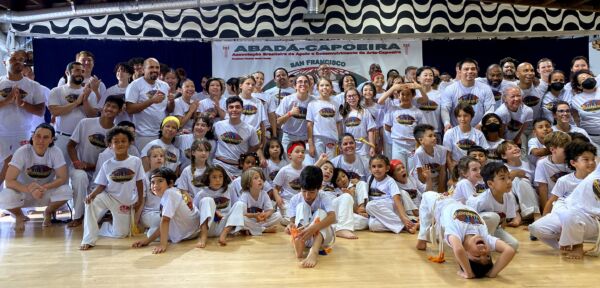YOUTH & ADULT BATIZADO GRADUATION CEREMONY & PERFORMANCE and WORKSHOP SERIES
Theme 2024: “EQUALITY: Acknowledge everyone’s contribution as valuable. Never underestimate anyone, especially ourselves.”

YOUTH | ADULT
BATIZADO, PUBLIC PERFORMANCE, GRADUATION CEREMONY
Mestra Márcia Cigarra, Instrutor Soldadinho & Graduada Toninha
MASTER WORKSHOPS
Coming up soon!
Guest of Honor:
Special Guest:
Confirmed Guests:
The Batizado Tradition
The batizado is a traditional Capoeira ceremony in which new students are initiated into the world of capoeira. New students receive a capoeira nickname and play with a Master or Instructor, symbolically welcoming them into the capoeira community.
For continuing students, the batizado is a time of celebration and recognition of their growth in capoeira. New and continuing students receive a cord that represents their level.
What is a Batizado?
The Batizado is Capoeira’s most significant tradition. The batizado tradition formally welcomes beginners into our school, and some students are awarded a new cord during the troca de corda or “changing of cords” ceremony. To “baptize” new students into Capoeira, each new student plays a jogo (game) with a high-level instructor or master, receives their first cord, and gets their “apelido” (nickname.)
“Troca De Corda” aka Changing Of Cords Ceremony
The batizado event provides the opportunity to celebrate student achievement and the collective growth of the school. Some new and continuing students receive a cord representing their level of skill, knowledge and dedication. Having cords that delineate and represent different levels also helps the leader of the school, in our case Mestra Marcia Cigarra, place the student in the appropriate training cohort for the year ahead.
There are different color systems for different populations. For example youth cord colors denote more levels—ponta, half cord, full cord—to mark a youth’s growth so that they arrive at the appropriate level upon entering the adult/teen cord system at age 16. The cord system continues to evolve as ABADÁ-Capoeira school grows and evolves.
Why “Apelidos” aka Nicknames?
Throughout Capoeira’s history, practitioners needed to protect their identity. During slavery, slaves used aliases to protect their identity from slave owners—particularly those who escaped captivity. After Brazil abolished slavery in 1888, former slaves remained marginalized within society. Many continued to gather and practice Capoeira, and the authorities began to associate it with anti-government and criminal activities. Post-slavery social conditions in cities were chaotic and police feared ex-slaves would join forces and use Capoeira to revolt against the government.
In 1890, Capoeira was outlawed in Brazil. Despite this, Capoeiristas continued to practice—in secret—adopting apelidos to make it difficult for police to discover their identities. The law prohibiting the practice of Capoeira remained in effect until 1920. Capoeira groups around the world continue to keep the tradition of apelidos alive.
The batizado tradition formally welcomes beginners into our school, and some students are awarded a new cord during the troca de corda or “changing of cords” ceremony. To “baptize” new students into Capoeira, each new student plays a jogo (game) with a high-level instructor or master, receives their first cord, and gets their “apelido” (nickname.)

